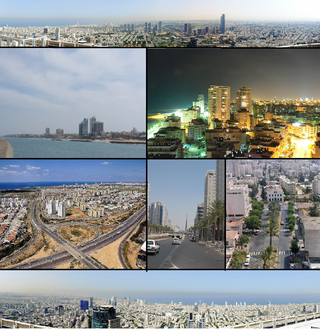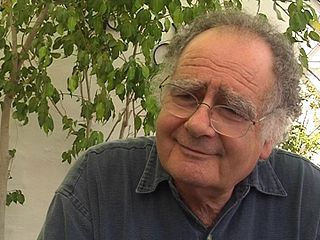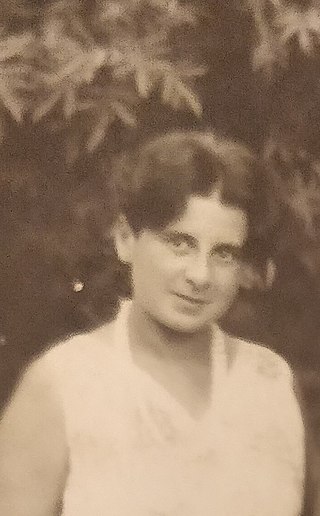
Gush Dan or Tel Aviv metropolitan area is a conurbation in Israel, located along the country's Mediterranean coastline. There is no single formal definition of Gush Dan though the term is in frequent use by both governmental bodies and the general public. It ranges from combining Tel Aviv with cities that form urban continuum with it to the entire areas from both the Tel Aviv and the Central District or sometimes the whole Metropolitan Area of Tel Aviv. which includes a small part of the Southern District as well. Gush Dan is the largest conurbation and metropolitan area in Israel, with the metropolitan area having an estimated population of 4,156,900 residents, 89% of whom are Israeli Jews.

Tel Aviv Museum of Art is an art museum in Tel Aviv, Israel. The museum is dedicated to the preservation and display of modern and contemporary art from Israel and around the world.

Nachum Gutman was a Moldovan-born Israeli painter, sculptor, and author.

Meir Dizengoff was a Zionist leader and politician and the founder and first mayor of Tel Aviv. Dizengoff's actions in Ottoman Palestine and the British Mandate for Palestine helped lead to the creation of the State of Israel. David Ben-Gurion declared Israeli independence in 1948 at Dizengoff's residence in Tel Aviv. Dizengoff House is now Israel's Independence Hall.

Pinhas Rutenberg was a Russian Jewish businessman, hydraulic engineer and political activist. He played an active role in two Russian revolutions, in 1905 and 1917. During World War I, he was among the founders of the Jewish Legion and of the American Jewish Congress. Later, he immigrated to Mandatory Palestine, and through his connections managed to obtain a concession for production and distribution of electric power and founded the Palestine Electric Corporation, currently the Israel Electric Corporation. A vocal and committed Zionist, Rutenberg also participated in establishing the Haganah, the main Jewish militia in pre-war Palestine, and founded Palestine Airways. He subsequently served as a President of the Jewish National Council.

The White City is a collection of over 4,000 buildings in Tel Aviv from the 1930s built in a unique form of the International Style, commonly known as Bauhaus, by German Jewish architects who fled to the British Mandate of Palestine from Germany after the rise to power of the Nazis. Tel Aviv has the largest number of buildings in the Bauhaus/International Style of any city in the world. Preservation, documentation, and exhibitions have brought attention to Tel Aviv's collection of 1930s architecture. In 2003, the United Nations Educational, Scientific and Cultural Organization (UNESCO) proclaimed Tel Aviv's White City a World Cultural Heritage site, as "an outstanding example of new town planning and architecture in the early 20th century." The citation recognized the unique adaptation of modern international architectural trends to the cultural, climatic, and local traditions of the city. Bauhaus Center Tel Aviv organizes regular architectural tours of the city.

Gabriel Shamir (1909–1992) and Maxim Shamir (1910–1990) were Israeli graphic designers. They designed Israel's official state emblems, medals, stamps and currency notes.

Rothschild Boulevard is one of the principal streets in the center of Tel Aviv, Israel, beginning in Neve Tzedek at its southwestern edge and running north to Habima Theatre. It is one of the most expensive streets in the city, being one of the city's main tourist attractions. It features a wide, tree-lined central strip with pedestrian and bike lanes.

Ze’ev Raban (22 September 1890 – 19 January 1970), born Wolf Rawicki (Ravitzki), was a leading painter, decorative artist, and industrial designer of the Bezalel school style, and was one of the founders of the Israeli art world.
The architecture of Israel has been influenced by the different architectural styles of those who have inhabited the country over time, sometimes modified to suit the local climate and landscape. Byzantine churches, Crusader castles, Islamic madrasas, Templer houses, Arab arches and minarets, Russian Orthodox onion domes, International Style modernist buildings, sculptural concrete Brutalist architecture, and glass-sided skyscrapers all are part of the architecture of Israel.

Joseph Barsky was an architect in Ottoman and Mandatory Palestine.

Micha Ullman is an Israeli sculptor and professor of art.

Carl Rubin was an Israeli architect known for his work in the international style. He designed many of the iconic buildings in this style in Tel Aviv.

Yehuda Magidovitch (1886–1961) was one of the most prolific Israeli architects. Among his prominent works are the Galei Aviv Casino, a café-restaurant, and the Cinema Esther, both in Tel Aviv.

The Levant Fair was an international trade fair held in Tel Aviv during the 1920s and 1930s.

The Levin House, in Hebrew Beit Levin - Tel Avivians gave it the nickname "the Castle" and later called it the Russian Embassy House - is a historic building located at 46 Rothschild Boulevard on the corner of Shadal Street in Tel Aviv, Israel, and is one of the city's best-known buildings.

Moti Bodek is an Israeli architect. He is the CEO of Bodek Architects based in Tel Aviv and a Professor of Architecture at Bezalel Academy of Art and Design, Jerusalem & at Tel Aviv University.

Esther Berlin-Joel (also known as Esther Berli-Joel, Esther Barli-Joel, in Hebrew: אסתר ברלי-יואל, was a German-born Israeli painter and graphic designer. She designed the coats of arms for the Israeli cities of Haifa and Holon.

Rothschild 22 Tower is a 29-story Israeli skyscraper reaching 117.9 meters in height, with an additional 9-meter tall decorative mast, and which covers an area of 1.9 dunam.

Nahalat Binyamin is a partially car-free street and a neighbourhood in Tel Aviv, Israel.






















